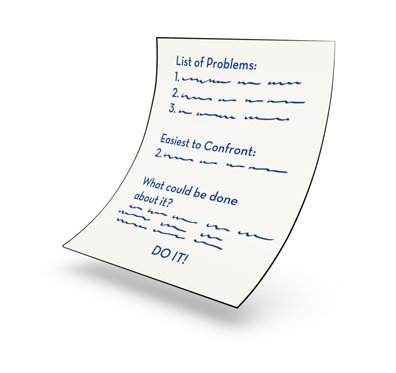Being Able to Confront
There is always something in a person’s life that he can confront. Confront means to easily face someone or something without avoiding him or it. If a person can confront some difficulty or part of it, he can do something about it.
This is a very workable principle as it opens the door to helping anyone bring improvement to an area of his life.

For example, a social worker is visiting a woman called Mrs. O’Leary in her home. Mrs. O’Leary has a lot of problems and tells them to the social worker.
Let’s say Mrs. O’Leary complains that her husband is drunk all the time and never brings home any pay. The furniture is all broken and the rent is behind.
The social worker, with the best intentions, might say, “What you should do, Mrs. O’Leary, is clean this whole place up. Scrub it down from top to bottom. After all, we’ve given you soap. And get your children cleaned up and put in those nice new dresses we sent you. Now, I’ll have a talk with your husband concerning his drinking.”
Even if Mrs. O’Leary would have cleaned up the whole place and put the children in the nice clothes, she and the social worker are now in total disagreement. The social worker has told Mrs. O’Leary something that Mrs. O’Leary knows by experience cannot be done. She also knows nobody can talk to her husband about his drinking. She doesn’t think even a full-scale attack by the United States Army could do anything about Mr. O’Leary’s drinking. She knows this. And the social worker has just run head-on into Mrs. O’Leary’s complete certainty on this point.
Let’s say that instead the social worker had found something that Mrs. O’Leary could confront doing and had asked her to do that. Although this sounds very simple, it is very, very workable.
She might have noticed that during their conversation, Mrs. O’Leary had emptied an ashtray. So she says, “I’ll tell you what I would do. I would start in on this thing a little bit at a time, and I would get the place cleaned up. Now, why don’t you keep the ashtrays emptied?”
At first Mrs. O’Leary might get a little angry with the social worker. But after the woman has left, she will go around emptying the ashtrays.
It is quite surprising. All of a sudden, Mrs. O’Leary might feel a great sense of hope. She is not being asked to climb too high a hill. She is being asked to confront doing something that she feels she can do. Sooner or later, she might even get the idea that there is something that can be done about Mr. O’Leary’s drinking.
The technique is to find out what the problems are and then get something done about them that can be done by somebody who can do it.
The first level of hope is “There is something to be done about it, ” and the second level is “It is something that you can do.”
This principle of giving a person something they can confront doing is very, very useful in many areas.
People often don’t know how to get along in life any further. They feel they cannot make any improvement in life, that it is impossible to be any better. But using this information, you could show a person or even a whole group of people that it is possible to get better.

Start by telling the person you want to help, “Write down on a piece of paper a short list of the problems you have in your life.”
When he has done that, ask, “Which one of those is the easiest for you to confront? Now write that down.”
Then tell him, “Now write down what you absolutely know for sure you could do about that last thing you wrote down.”
And finally, tell him, “Now, you see what you’ve written down at the bottom of this page? Do it!”
Using these principles, you could become a very successful advisor. Get an estimate of what people consider to be their problems and difficulties. Then find out from them which ones they feel they can confront. You end up with one problem or difficulty, and what they would be able to face doing about that problem. And they will do something about it and they will win.
The only thing to watch out for is that people sometimes start moving with too much confidence and, like a baby who has just learned how to walk, go rushing across the room at a high run. They usually fall on their faces about the third step. They can get too ambitious. So you have to give the advice, “Don’t do any more than this right now.”
If you make it your business to (1) rapidly get an estimation of what a person thinks is wrong; then (2) find out which one of these points he can confront; then (3) find out what he is going to do about that point that he thinks he can do; and then (4) get him to do it, and at that point you become terribly insistent on the subject of getting that point done, you will have agreement every time.
They know you’re advising them on their estimate of the situation and so you speak true.

